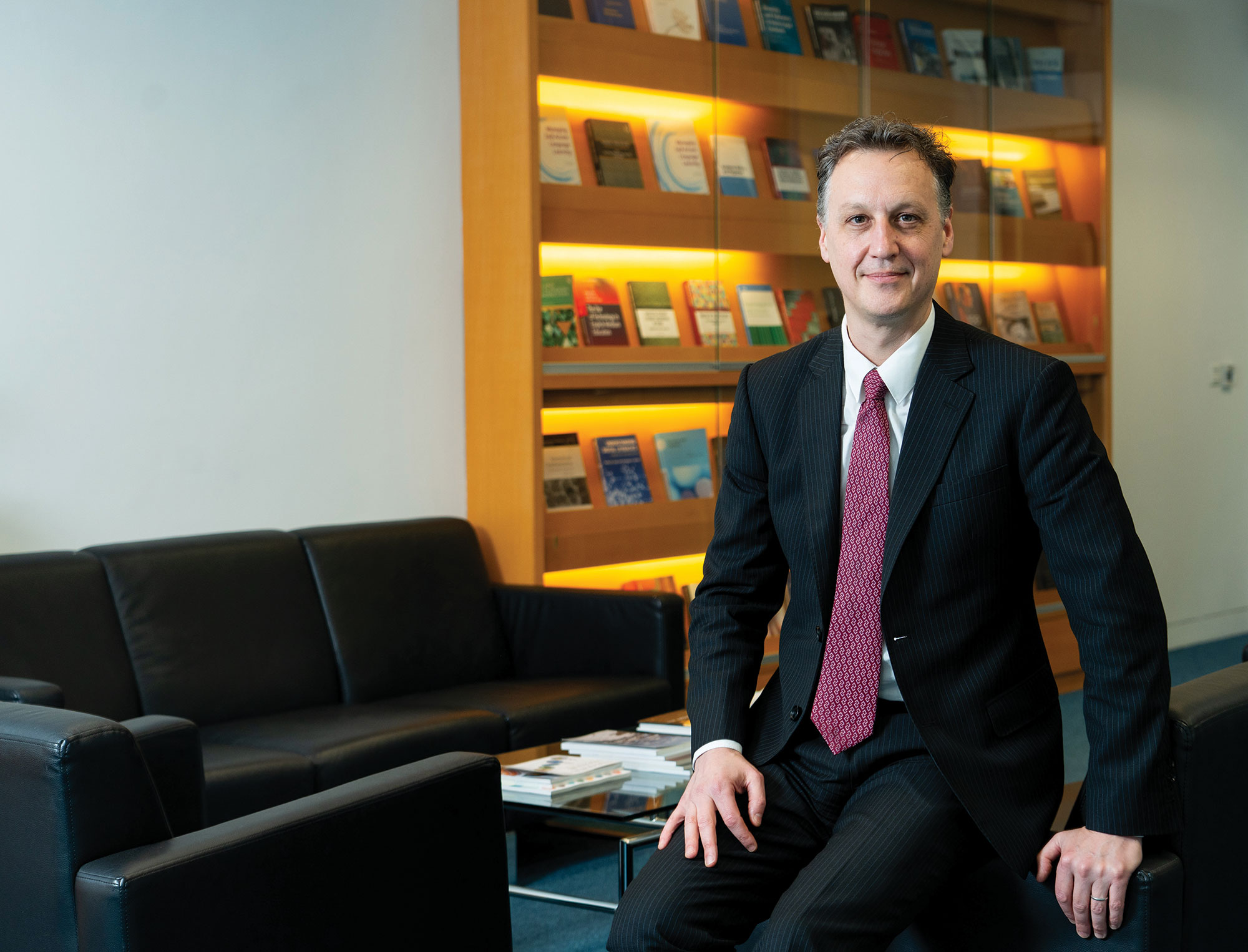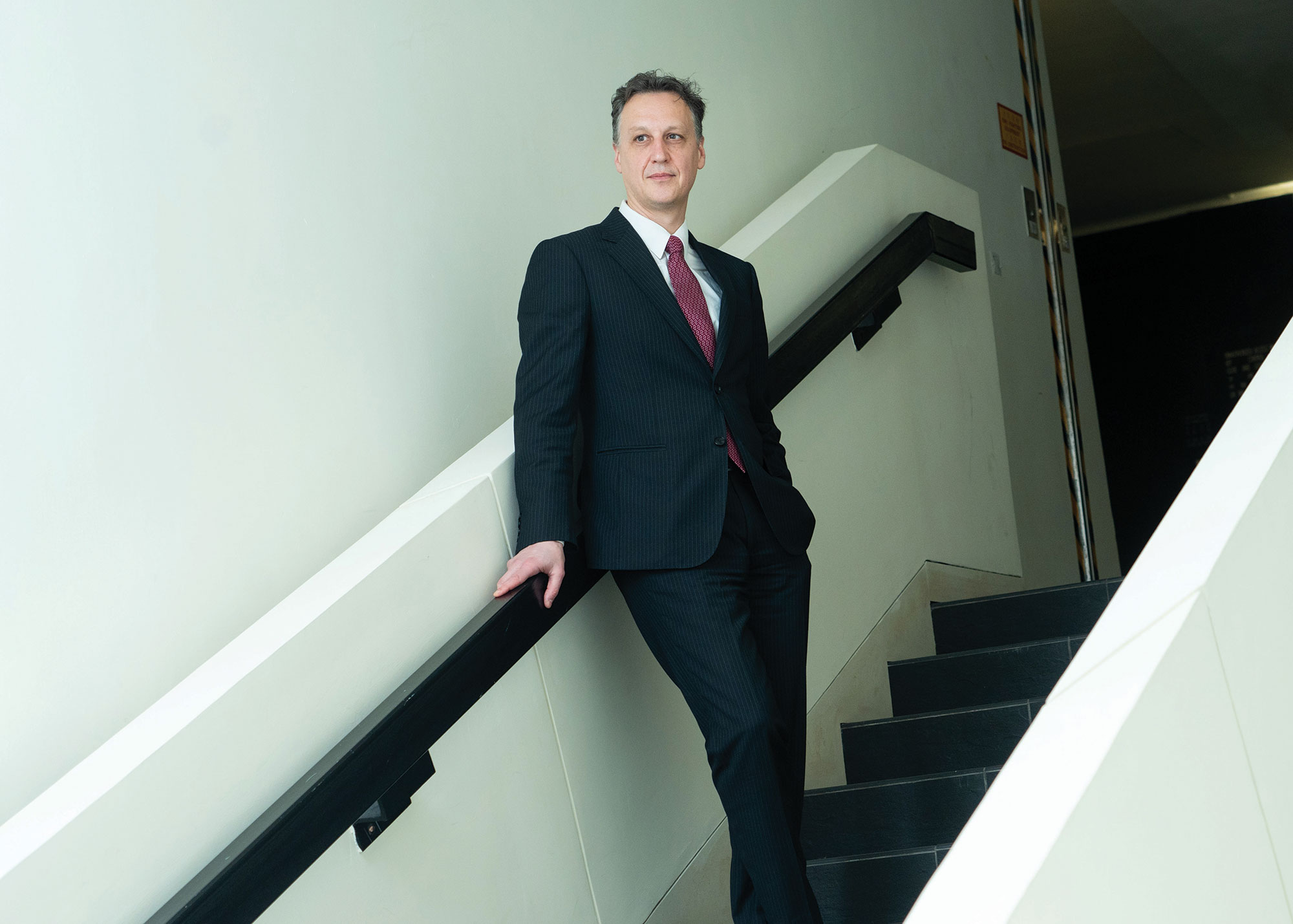A Pathway to a Deeper Understanding of Global Realities
English scholars, like Professor Jason HARDING, can greatly contribute to human understanding of our lived experience, helping to define meaning and purpose for citizens in the modern worldTo achieve great things and reach great heights requires a visionary leader at the helm. With a clear mission and a set of tangible goals, Professor Jason HARDING stepped into the role of Head of the Department of English (EN) at City University of Hong Kong (CityUHK) with an unwavering determination to establish the department as a pioneering force in Asia.
“I think EN at CityUHK has enormous potential and I believe my leadership and expertise can help to unlock that potential,” he says.
With more than two decades of teaching and research experience, Harding has honed a successful career at one of the world’s leading English departments joining from his most recent posting in the UK. But with a desire to head back to Asia, Harding says he couldn’t pass up the opportunity when a position came up in Hong Kong at CityUHK.
“Especially because it’s in Hong Kong and it just seemed like a perfect challenge,” he says.
A Wide Scholarly Network
Moreover, apart from a wealth of research experience, he also brings extensive scholarly networks from the UK and Europe, North America and Asia which through visiting professorships, collaborations and conferences, he says, would significantly enhance and promote EN’s international profile.
“We aim to do this through strategic ‘peaks of excellence’ in sharply defined areas of research strength and by strengthening our collaborative research networks both within Hong Kong and beyond,” he says.
Indeed, he comes with remarkable like-mindedness to the University’s overarching goals, which is to inspire and nurture the next generation of innovative minds in multiple disciplines who will have a broad vision, willingness and capability to use their knowledge to serve their communities.
According to Harding, many of the areas that he will be growing, such as digital humanities and healthcare communication, align directly with CityUHK’s ambitious strategic missions.
And at the heart of Harding’s vision for the Department is a recognition of the complex relationship between technology, humanities and ethics in a rapidly changing world. He believes that while English studies has always been a dynamic and contested field of knowledge, the new wave of new technologies sweeping 21st century life will also transform scholarship in the humanities.
We live in the shadow of science and technology, but its meaning is not defined by scientists alone. Humanities can deepen and extend our understanding of science and technology
Professor Jason Harding
Pioneering Digital Literacies
In fact, he is among the pioneers with first-hand experience in the impact of digital technology on humanities. One of Harding’s most impressive works, which he says is also his proudest scholarly achievement, is a 1,000-page volume which he edited for the award-winning The Complete Prose of T.S. Eliot: The Critical Edition. What made the project so ground-breaking in the field of digital humanities was that Johns Hopkins University Press gave priority for it to be developed online over the standard print edition, which was the norm then.
“To do that,” Harding says, “it required a lot of pioneering techniques in transferring a huge amount of archive material to a digital database and developing a really ground-breaking online platform.”
With such a depth of experience and knowledge, Harding comes to CityUHK with a bucket list of things that he hopes to achieve, starting by being part of the College’s interdisciplinary mission to produce humanistic perspectives on frontier research in science and engineering. He believes that it is important that expertise in the College is deployed to provide a fully-rounded approach to tackle some of the global challenges facing humanity.
“EN’s defined ‘peaks of excellence’ in digital literacies, professional and healthcare communication, urban studies and cross-cultural encounters will address the radical transformations to society and culture as well as some of the biggest challenges facing humanity in the 21st century,” he says.
To this end, he says that the linguistic complexities of narrative and metaphor remain essential tools for human understanding of our lived experience, shaping meaning and purpose for people. This is why scholars in EN, as experts in their field, have much to contribute to contemporary culture and society.
Humanities Define Science & Tech
In fact, Harding recently held a seminar examining how humanities can shape the understanding of science and technology, pointing to the recent Oscar-winning film biopic Oppenheimer as a case example of how the creative arts provide an imaginative framework for processing the human implications of something as important and dangerous as nuclear weapons.
“We live in the shadow of science and technology, but its meaning is not defined by scientists alone,” he says. “Humanities can deepen and extend our understanding of science and technology.”
As such, Harding is currently engaged in an exciting research cluster which examines urban narratives and representations of the city as a crucial dimension of our lived experience in the modern world. This research will be on display at a forthcoming international conference called “Urban Mediations” at the CityUHK Run Run Shaw Creative Media Centre.
“It will be a superb opportunity to showcase our research at CityUHK to an international audience and we hope it will be the first of several major collaborative events,” he says.
As AI technologies advance and global challenges like climate change and sustainability become more pressing, human beings will seek to make sense of these issues in relation to their own lives. In this regard, Harding argues that forms of imaginative expression, such as film, fiction, and essays, are a crucial way that societies engage with and debate these challenges. These artistic mediums will then provide a valuable lens through which humans can gain a deeper understanding of the complexities and realities of the world we live in today.
“All citizens will have a stake in these discussions,” Harding says. For this reason, he is also passionate about inspiring his students to become life-long learners in today’s changing world and develop creative and analytical skills that will equip them for the future workplace.
“CityUHK’s emphasis on discovery-enriched learning and curiosity-driven research is the foundation of the work we do in EN in nurturing future world-class scholars,” he says.
He notes that one of the areas where the Department at CityUHK outperforms UK departments of English is students’ employability after they graduate. He credits the professional Final Year Project as a crucial factor behind the Department’s recorded nearly 100 per cent employment rate among its recent graduates.
“It provides students with invaluable workplace experience and as Head of Department, I have been delighted to learn about the wonderful work our students do with external partners such as Orbis and Hong Kong Generation Next Arts. It makes me proud to see how valued our students are by the wider community,” he says.




